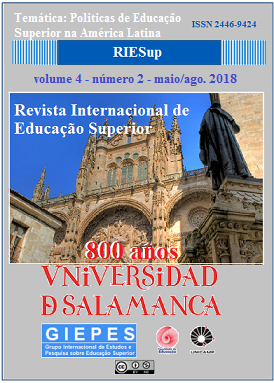Abstract
Cinematographic works offer us rich raw material for new understandings of the world, culture and languages that can be reconstructed in different contexts, as well as launching sensitive and ambiguous issues that arise as concerns to learn to think about institutionalized violence. Through a hermeneutical approach, we interpret and understand the Game of Thronesseries as a possibility to establish a counterpoint to the complex dynamics of physical violence in the social arena, because there are technical issues related to the market that underlie the film that provoke us to reflect on the poignant problems in contemporary life. Education, in this sense, has a political dimension to challenge with the cinematographic work itself the established standards, enabling new debates to re-educate the mass and violent modes of action, in order to respect and value the socio-cultural differences. Only by a path of endless reconciliation with the other in their differences and social conflicts can we overcome the individualistic feeling in the face of violence and the permanent controversial relations and conflicts that devastate us. The results indicate that it is necessary to take into account the institutionalized form in which education takes place as the appropriation of knowledge of the cultural industry, to overcome the truisms and banalities of the world and to establish educational dialogues less oppressive, passive and conformist, articulating social projects against recidivism or perpetuation of marketed violence and other types of barbarism at school.
References
ADORNO, Theodor W. Educação e emancipação. 3. ed. Rio de Janeiro: Paz e Terra, 2003.
ADORNO, Theodor W. Palavras e sinais – modelos críticos. Rio de Janeiro: Vozes, 1995.
ADORNO, Theodor W; HORKHEIMER, Max. A Dialética do Esclarecimento. Rio de Janeiro: Jorge Zahar, 1985.
ADORNO, Theodor W. O Fetichismo na Música e a Regressão da Audição. São Paulo: Nova Cultura, 1996. (Col. Os Pensadores).
ADORNO, Theodor W. Indústria cultural e sociedade. Trad. Julia Elisabeth Levy. São Paulo: Paz e Terra, 2002.
ADORNO, Theodor W. Teoria da semicultura. Trad. Newton Ramos-de-Oliveira, Bruno Pucci, Claudia B. Moura Abreu. Educação & Sociedade: revista quadrienal de ciência da educação, Campinas, ano XVII, n. 56, p. 388-411, dez./ 1996.
ADORNO, Theodor W. A indústria cultural. In: COHN, Gabriel (Org.). Theodor Adorno. São Paulo: Ática, 1986. (Col. Grandes Cientistas Sociais).
BECKER, Fernando. Freire e Piaget em Relação: um ensaio interdisciplinar. Educação e debate, Mauá, v. 1, p. 46-53, mar. 1998.
BENJAMIN, Walter. Magia e técnica, arte e política: ensaios sobre literatura e história da cultura. v. 1. São Paulo: Brasiliense, 1994. (Obras escolhidas).
FREIRE, Paulo. Política e educação. São Paulo: Paz e Terra, 2014.
FREIRE, Paulo. Pedagogia do Oprimido. Rio de Janeiro: Paz e Terra, 1987.
FREITAS, Verlaine. Adorno e a arte. São Paulo: Companhia das Letras, 2003.
Game of Thrones. HBO / Home Box Office. Criador: David Benioff e D. B. Weiss. Produção: Bernadette Caulfield, Frank Doelger, David Benioff, D. B. Weiss, Lynn Styles e George R. R. Martin. (2011-2016).
HABERMAS, Jürgen. O Discurso Filosófico da Modernidade. Lisboa: Dom Quixote, 1990.
HORKHEIMER, Max. Teoria Tradicional e Teoria Crítica. In: BENJAMIN, W.; HORKHEIMER, M.; ADORNO, T. W.; HABERMAS, J. Textos Escolhidos. São Paulo: Abril Cultural, 1991. (Os Pensadores).
KANT, I. Resposta à pergunta: que é esclarecimento (Aufklãrung)?. In: KANT, I. Textos seletos. Petrópolis: Vozes, 1974. p. 101-117.
LATOUR, Bruno. Reflexão Sobre o Culto Moderno aos Deuses Fe(i)tiches. Trad. Sandra Moreira. Bauru: EDUSC, 2002.
LOUREIRO, Robson. Educação, cinema e estética: elementos para uma reeducação do olhar. Educação e Realidade, Porto Alegre, v. 33, n.1, p. 135-154, jan/jun. 2008. Disponível em: http://seer.ufrgs.br/educacaoerealidade/article/view/6691. Acesso em: 12 maio 2017.
TÜRCKE, Christoph. Sociedade excitada: filosofia da sensação. Campinas: Editora da Unicamp, 2010.
VANOYE, Francis; GOLIOT-LÉTE, Anne. Ensaio sobre a análise fílmica. São Paulo. Papirus Editora, 2005.
ZANOLLA, Rosa Silva. Educação e barbárie: aspectos culturais da violência na perspectiva da teoria crítica da sociedade Sílvia. Soc. e Cult., Goiânia, v. 13, n. 1, p. 117-123, jan./jun. 2010.
ZUIN, Antônio. Copiar, colar e deletar: a Internet e a atualidade da semiformação. Pro-Posições, Campinas, v. 24, n.3, p. 139-159, set./dez. 2013.
ZUIN, Antonio A. S.; PUCCI, Bruno; OLIVEIRA, Nythamar Ramos de. Adorno: O poder educativo do pensamento crítico. Petrópolis: Vozes, 2008.

This work is licensed under a Creative Commons Attribution 4.0 International License.
Copyright (c) 2018 Adilson Cristiano Habowski, Elaine Conte, Lilian Soares Alves Branco


